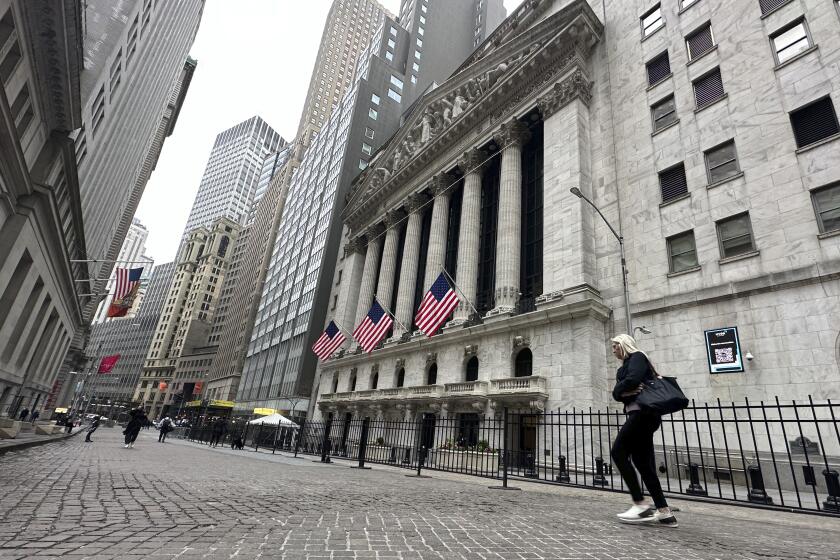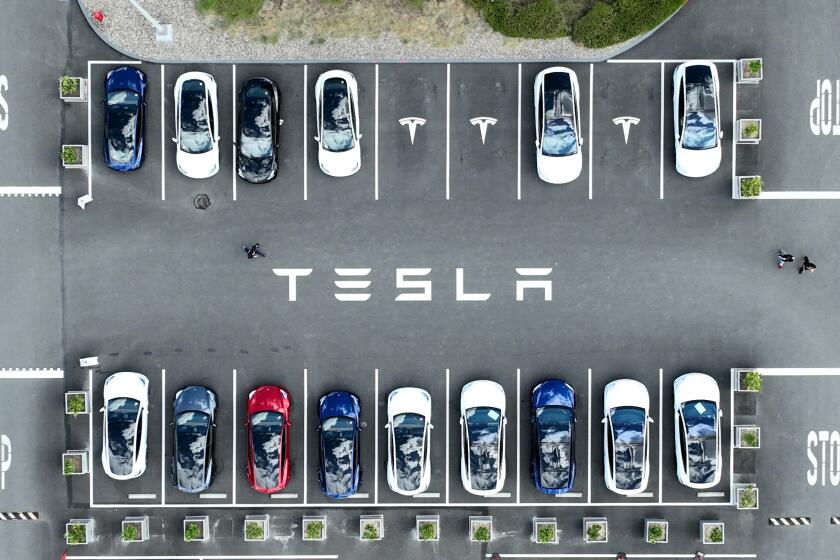Feds Subpoena Firm Controlled by News Corp.
NDS Group, a company controlled by Rupert Murdoch’s News Corp., was hit with 31 grand jury subpoenas Wednesday in a federal probe involving allegations of high-tech sabotage.
NDS, a British company whose U.S. offices are in Newport Beach, makes smart cards that prevent piracy of digital television signals. The company’s cards are used in 27 million television sets worldwide. The federal criminal probe, and a separate civil suit, involve allegations that NDS hacked competitors’ cards, abetting widespread piracy.
An NDS spokeswoman said Wednesday that the company would cooperate fully with the government’s investigation.
A Justice Department spokesman declined to comment. The subpoenas demand that the company hand over a variety of documents.
NDS was sued in March by a competing smart-card developer, Canal Plus Technologies. Last week, two other companies, EchoStar Communications Corp. and NagraStar, filed papers in U.S. District Court in San Francisco declaring they intended to join the suit.
News Corp., which owns 80% of NDS, has been trying to get the case dismissed or dropped. This week, it announced a new deal with Canal Plus’ parent, troubled French media company Vivendi Universal, to buy Vivendi’s Italian pay-TV system. One clause in the deal: The lawsuit dies.
That is looking increasingly unlikely, however, because of the government inquiry and the widening civil suit.
The case, experts say, moves to the forefront the issue of whether companies can be electronically secure in a world where hacking is all too easy--and often untraceable. The financial stakes are high. Canal Plus, for example, is seeking $1 billion in damages.
“None of these allegations are surprising. All the pieces are out there to do things like this,” said computer security consultant Bruce Schneier. “This is a harbinger of things to come.”
The allegations rank among the biggest public accusations ever of intellectual property theft, experts said. In 2001, according to the Trends in Proprietary Information Loss Survey, 40% of the companies responding reported the theft, loss, destruction or misappropriation of their intellectual property. Total reported losses were $56 billion to $59 billion.
The entertainment and technology industries have been watching the case with particular interest. Television is moving quickly toward digital delivery, which offers both superior images and improved reception over the traditional analog transmissions.
To restrict access to authorized viewers, digital systems will need to scramble their transmissions. Only customers with paid-up smart cards will be able to get a clear signal. That’s the plan, but the economics will get murky if consumers find it cheaper to buy counterfeit cards. Many viewers have been doing exactly that. In the U.S., EchoStar and DirecTV count about 18 million subscribers--and 1 million pirates.
Federal investigators first became interested in NDS late in 2000 when one of the company’s engineers, Christopher Tarnovsky, was informed by police that he had received two packages at a commercial mailbox he rented in San Marcos, Texas. According to court documents, one package contained a DVD player that had $20,000 hidden inside; the other contained a CD player that had a hidden $20,100. The packages were mailed from Canada.
Tarnovsky’s lawyer believes he was set up.
“That is the only theory that makes sense,” said San Diego attorney Pamela Naughton. No charges have been filed in the matter. Naughton said she hadn’t seen the subpoenas issued Wednesday. “The government is being used as a tool by the people who want to bring down NDS for their own personal financial reasons,” she said.
Tarnovsky is the central figure in the civil case. Canal Plus and, more extensively, EchoStar and NagraStar allege that NDS hacked their encryption systems and Tarnovsky then transmitted their secret codes to a Canadian Web site frequented by digital pirates. NDS denied in court that Tarnovsky transmitted the codes, as did Naughton.
“We don’t believe there is any evidence he was responsible for posting any codes, and there is no proof,” she said.
NDS’ goal, the plaintiffs in the civil case allege, was to weaken its competitors. At one point, NDS was on the verge of losing a contract to NagraStar, court filings claim. So NDS hacked the Nagra- Star system, encouraging a host of pirates and discouraging a TV system customer from switching services, the filings claim.
EchoStar and NagraStar asked the court to protect all documents filed and depositions taken in the case, even if Canal Plus were to drop out. Vivendi is selling Canal Plus to consumer electronics maker Thomson Multimedia for $186 million. It was unknown whether Thomson would have any interest in keeping the suit alive.
EchoStar, the second-largest U.S. satellite TV company, is struggling to salvage its takeover of the largest, DirecTV, a unit of Hughes Electronics Corp. NagraStar is a joint venture of EchoStar and Switzerland’s Kudelski Group, another major smart-card developer.
NDS Chief Executive Abe Peled said Monday that the new allegations by EchoStar and NagraStar were “basically a repetition” of Canal Plus’ “groundless lawsuit” and “an attempt to harm NDS and thwart legitimate competition.”
Meanwhile, NDS is the defendant in another suit, filed last month by DirecTV, which hired NDS in 1999 to provide smart-card encryption for its 11 million customers.
The sealed lawsuit accuses NDS of breach of contract, fraud, breach of warranty and misappropriation of trade secrets, DirecTV said. NDS denies the charges.
As part of its attempt to get the civil case dismissed, NDS in August asked U.S. District Judge Vaughn Walker for a preliminary injunction, a request that he called “almost silly” in court.
“You haven’t even come close” to establishing the legal grounds for an injunction, Walker told NDS lawyers. Those grounds include a likelihood that NDS would prevail in the case. “No way in the world I can make a declaration on the record that you’re likely to prevail,” the judge said. “You’re dead right out of the box.”
Over the protests of NDS lawyers, the judge allowed depositions to proceed. Two weeks ago, Canal Plus lawyers deposed NDS chief Peled as well as the company’s security chief and a key engineer.
Digital pirates frequently bought their counterfeit cards in Canada, where it was legal to pirate American broadcasts until last spring. Reprogrammed cards were sold openly in border cities. Even now, after a Canadian Supreme Court ruling that made the piracy illegal, trade is still brisk, if more clandestine.
In Europe, piracy is even worse. AEPOC, the European anti-piracy group, estimates that viewers there spend about $1 billion a year on pirated television. Legitimate revenue is about $5 billion.
“There is a general attitude that piracy is not a crime, particularly in Italy,” said Davide Rossi, the group’s secretary-general.
Telepiu, one of the two Italian pay-TV systems, had as many as three freeloaders for every one paying customer. Partly as a result, Telepiu lost about $200 million in 2001. That proved a big drain on its owner, Vivendi, which announced a deal in June to sell Telepiu to News Corp., owner of the other platform. Negotiations faltered over the summer but now seem to have been finalized.






